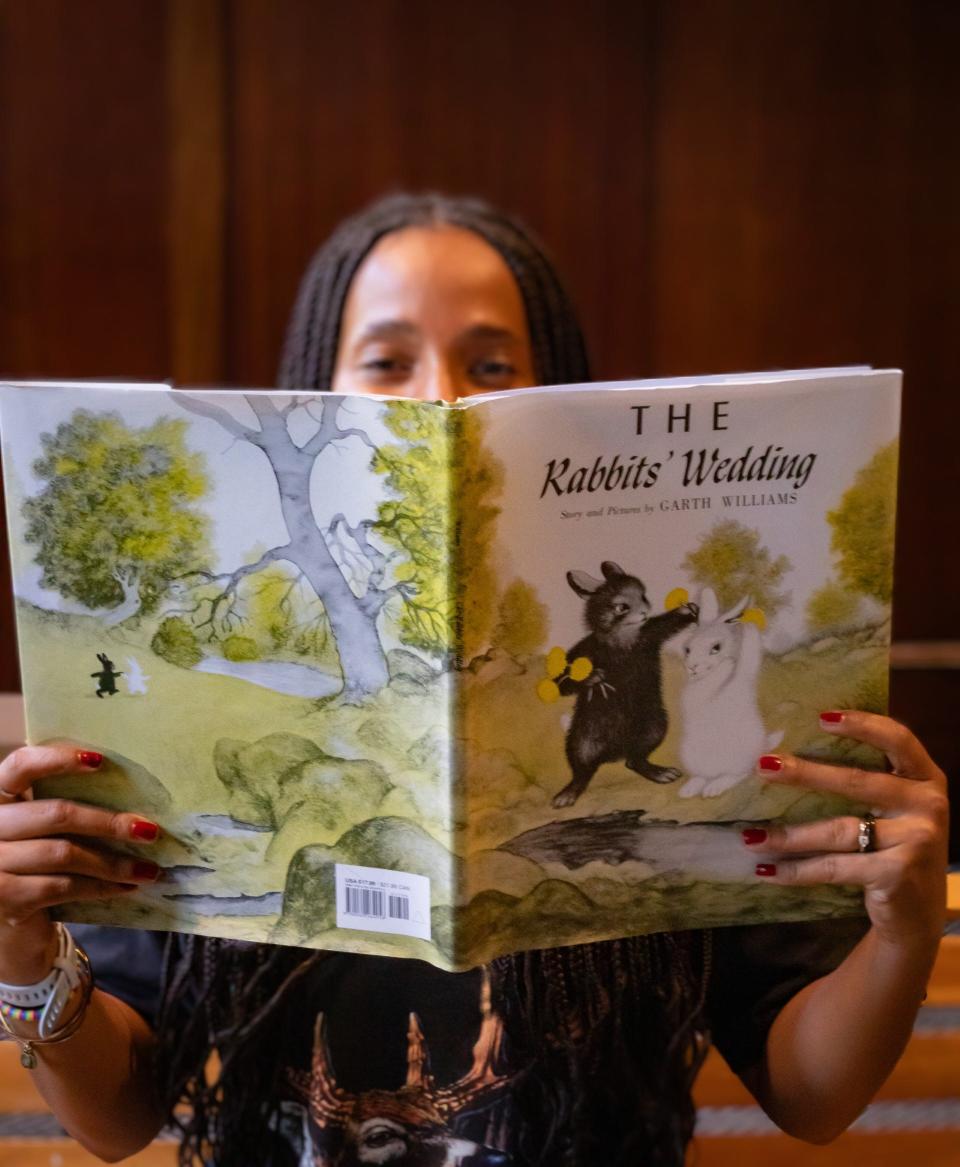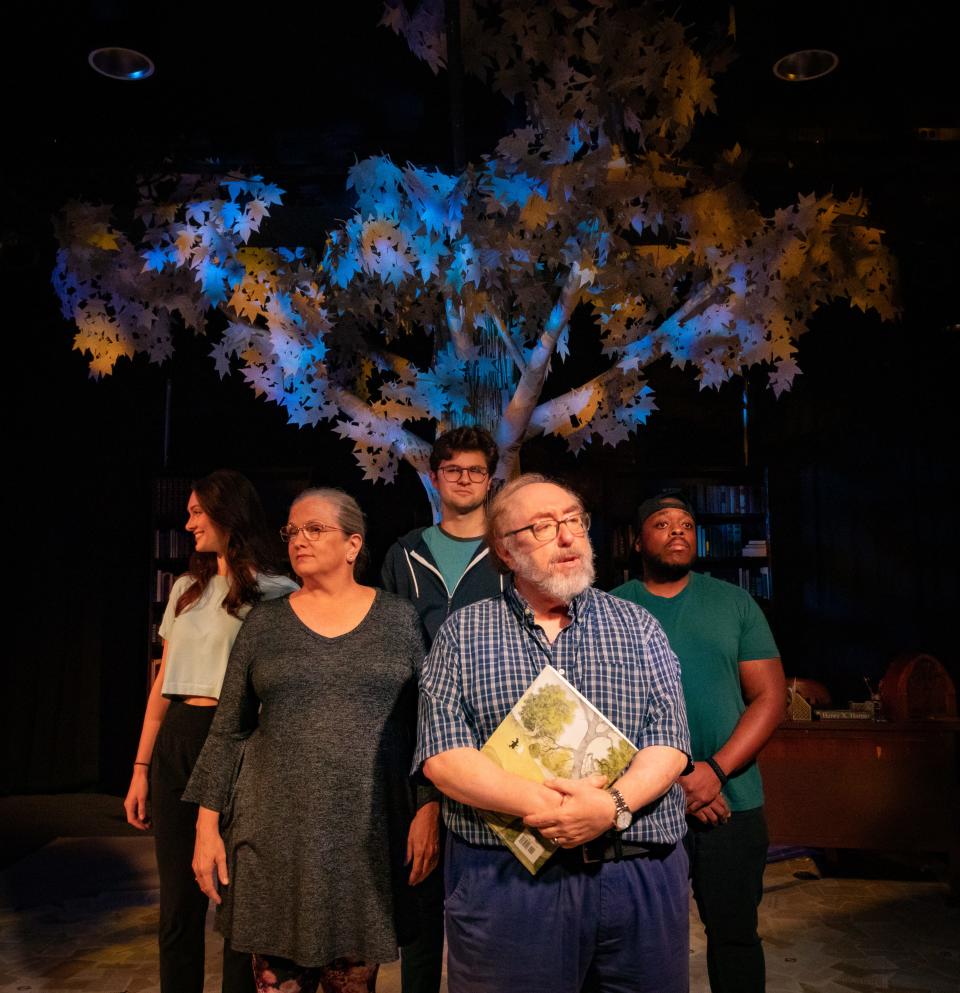'We are deep in the activism of it': Pensacola Little Theatre to debut play on book bans
- Oops!Something went wrong.Please try again later.
- Oops!Something went wrong.Please try again later.
When children’s book “And Tango Makes Three” was banned from all grade levels in Escambia County Public Schools in February, it started a wave of conversation, and a lawsuit, that would call into question what reading material is appropriate for the students of Escambia County.
As the conversation surrounding book censorship continues to pick up heat with over 200 books on Escambia County Public Schools’ challenge list, the Pensacola Little Theatre based out of The Center at 400 S. Jefferson St., is bringing the conversation to the stage through the depiction of "Alabama Story," a play inspired by true events during the Civil Rights Movement in 1959. The play is here to show that the question of censorship in libraries is something to take a stand on.
The play will run for two weekends starting with its opening night at 7:30 p.m. on Oct. 20.
What is the play 'Alabama Story' about?
Alabama Story was inspired by Emily Wheelock Reed, the state librarian of Alabama who fought in a censorship battle with a state senator in 1959 over a banned children’s book called “The Rabbits’ Wedding” created by famed author and illustrator Garth Williams. Williams was largely known for his artwork in children’s’ classics such as “Charlotte’s Web,” “Stuart Little” and “Little House on the Prairie.” The book was viewed as controversial for its time because a black rabbit was portrayed marrying a white one, and Reed was accused of pushing a pro-integration agenda by including the children’s book in the state’s collection.

The play illustrates the state’s attempts to ban the book from state libraries while also running a parallel story of a Black man and a white woman’s friendship during times of racial segregation. Reed, who will be portrayed by Pensacola Little Theatre’s artistic director Kathy Holsworth, advocates to keep the books on the shelves.
“Her point is − you can think whatever you want to think, but a library should be a repository for all sides of the question,” Holsworth said.
Playwright Kenneth said in an interview that he drew inspiration for the play when he was moved by reading the real-life Reed’s obituary in The New York Times in 2000.
The powerful play he created has created proactive conversations in the theatres it has been displayed in, such as the Roswell Cultural Arts Center in Georgia.
The Pensacola Little Theatre decided not only to show the play, but to take it one step further in helping patrons make connections with the county’s current events.
“I’m a Pensacola native and I went to Navy Point Elementary and Warrington Middle School and Escambia High School. I grew up in the public schools,” Holsworth said. “I’m just horrified at the backwards turn of our tiny community, the state itself, the entire nation. I don’t understand how we have lost the footing that we had in intellectual and emotional and social positive energy. So being able to put on this play was inspirational to us, just for being a well-written play.
"Now, we are deep in the activism of it,” Holsworth added.

How did it make its way to Pensacola’s Little Theatre?
Four years ago — years before Escambia County received its first book challenge — the Pensacola Little Theatre’s board received an unpublished copy of Alabama Story, written by Kenneth Jones. Little did they know the relevance it would have in their community years later.
“We’ve known that we wanted to do it, we just didn’t realize how prescient it was going to be. The more that our community went down this literal and figurative rabbit hole — the story is about rabbits — we were just gobsmacked. What should have been just a cute little interesting, historical well-written play for us has just turned into this story of maelstrom of relevance and messaging,” Holsworth said.
The Pensacola Little Theatre received funding from non-profit Sunday’s Child not only to produce the play, but bring in Jones to facilitate conversations, bring in banned book-author Nic Stone to speak, and provide copies of both “The Rabbits’ Wedding” and “And Tango Makes Three” to distribute to patrons after the show. They will also have free books to distribute that came out of Escambia teachers’ classroom libraries that they were unable to keep on the shelves.
“Gavin Parmely, who is the director of the show, he was the one who was inspired and said, ‘I would really love to tell the story,’” Holsworth said. “As the artistic director, I don’t just pick plays and then go find directors. It works from the inside out.”
Parmely is not shy to the spotlight, and recently gained attention as a male actor last August portraying Cinderella’s fairy godmother. His first Little Theatre play performance was in 2004.
“You just have to know Gavin. You have to know his fairy magical animated personality to know that it was just a no-brainer,” said Williams-Heath, executive director of The Center. “Because everything we do, all the casting that we do, it's always based on who's the most qualified, and who's the most talented for that role. And it's funny that while it's a very bold statement, we are so excited to make that statement. He truly was the most talented and qualified for the role.”
Williams-Heath looks at theaters as the most “accepting and culturally progressive places that a community will have” and said it is natural for theater productions to test the boundaries of representation in stories.
Fear of pushback won't detour it
Pensacola Little Theatre has rarely turned down a play in fear of it taking a controversial issue too far, according to Holsworth.
Shows like Alabama Story, which are part of the Pensacola Little Theatre’s Studio 400, can cater to more mature audiences that offer more “edgy, experimental experiences” along with locally written and produced pieces. The more intimate shows typically seat about 100.
The board, made up of community leaders, believes the story is an important one to tell.
“From within our community, we haven’t had any pushback. Well, we will not be surprised if it comes and there is either protests or negative publicity from people who don’t bother to come and hear and the play,” Holsworth said.
However, the lasting impact will be worth it.
“The thing about it is that — those books are still out there. So, no matter how hard these (expletive) fight against books for our children to read, either in the classroom or the school libraries, you keep fighting. Because books are not going away,” she said. “Much like all of the nonsense of us being embarrassed that Escambia County is in national and international news for being the dumbasses that our school district is – 'The Rabbit’s Wedding' was just one of dozens, if not hundreds, of books that Garth Williams wrote. And it’s a best-seller. Why? Because you told people they couldn’t have it.”
Where do I get tickets?
Tickets for each showing of "Alabama Story" can be found on The Center’s website under the "Alabama Story" tab. Café table seating is $25 and general admission seating is $18. Doors open 30 minutes prior to seating selection. There are four dates left for 7:30 p.m. shows this month including Oct. 20, 26, 27 and 28. There are also two 2:30 p.m. showtimes available on Oct. 22 and 29.
This article originally appeared on Pensacola News Journal: Pensacola Little Theatre set to debut 'Alabama Story' about book ban

